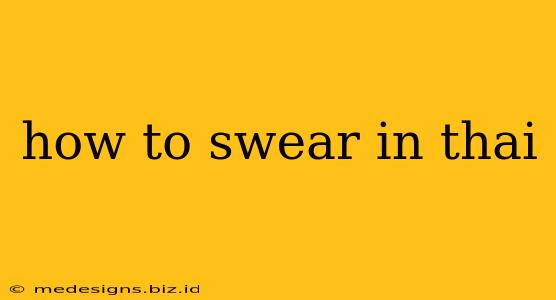How to Swear in Thai: A Comprehensive Guide for Cautious Learners
Thai, like any language, has a spectrum of vocabulary reflecting different levels of formality and intensity. While mastering polite Thai is crucial for navigating everyday situations, understanding informal and even vulgar expressions can offer a deeper insight into the culture – but use extreme caution. Misusing even seemingly innocuous words can lead to offense or misunderstandings. This guide will explore some Thai swear words, but remember: it's best to avoid using them unless you are completely fluent and confident in the context.
Understanding the Context of Thai Swearing
Before diving into specific words, it's vital to understand the cultural nuances. Thai society places a high value on respect and politeness. Swearing is generally frowned upon, especially towards elders or those in positions of authority. The severity of an insult also depends heavily on tone of voice, body language, and the relationship between the speakers. A word considered mild between friends might be highly offensive in a formal setting.
Mildly Informal Expressions (Use with Extreme Caution)
Even words considered "mild" in informal settings should be used with extreme caution, and only among close friends who understand the context. Misinterpretations can easily occur. Here are a few examples, but again, proceed with extreme care:
- บ้า (bâa): This translates literally to "crazy" or "insane." It's a relatively mild insult, but still inappropriate in formal situations.
- โง่ (ngồ): Meaning "stupid" or "foolish," this word carries a similar level of informality and should be avoided unless you are very comfortable with the person you are speaking to.
- เลว (lêew): This means "bad" or "evil." While not as harsh as other swear words, it is still considered impolite and should be avoided in most conversations.
Stronger Swear Words (Absolutely Avoid Unless You Are a Native Speaker)
The following words are considered strong insults in Thai. Do not use them unless you are a fluent speaker with a deep understanding of Thai culture and social dynamics. Even then, it's highly discouraged. These words can cause serious offense and potentially dangerous situations:
- ไอ้ (âi): This is a derogatory prefix used before masculine nouns, making any following word instantly offensive. Avoid using it at all costs.
- อี (ii): Similar to "âi," this is a derogatory prefix used before feminine nouns, and is extremely offensive.
- ควาย (kwāy): This word translates to "buffalo," but is frequently used as a derogatory term for a stupid or stubborn person. It is highly offensive.
- Various combinations involving these prefixes can create even stronger insults.
Alternatives to Swearing
Instead of resorting to swear words, focus on learning polite and appropriate ways to express frustration or disagreement. Thai offers a rich vocabulary for expressing emotions without being offensive. Learning these polite alternatives will serve you far better than attempting to use swear words.
Conclusion: Respect and Understanding are Key
Learning to swear in any language requires a deep understanding of its culture and social norms. While this guide provides a glimpse into Thai swear words, it emphasizes the importance of avoiding them unless you are exceptionally fluent and intimately familiar with the cultural context. Respectful communication is always the best approach, and focusing on polite Thai will serve you much better in the long run. Remember, a simple "ขอโทษครับ/ค่ะ (khɔ̌ thôːt khráp/khâ)" (excuse me, sir/ma'am) goes a long way!
